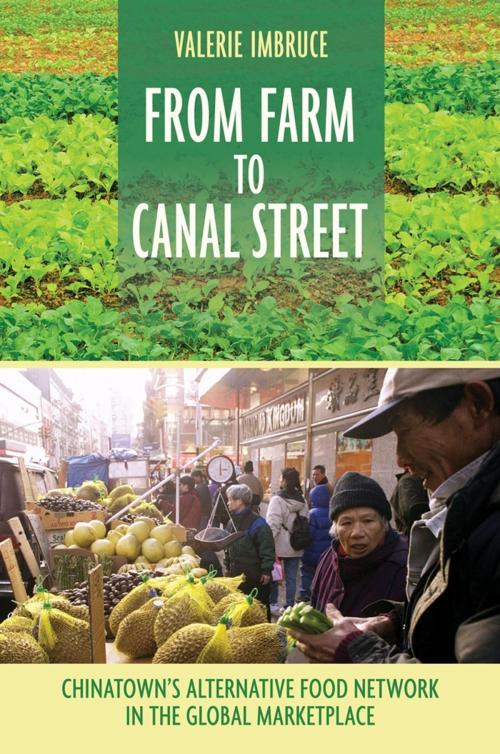From Farm to Canal Street
Chinatown's Alternative Food Network in the Global Marketplace
Nonfiction, Social & Cultural Studies, Social Science, Sociology, History, Americas, United States| Author: | Valerie Imbruce | ISBN: | 9781501701221 |
| Publisher: | Cornell University Press | Publication: | February 22, 2016 |
| Imprint: | Cornell University Press | Language: | English |
| Author: | Valerie Imbruce |
| ISBN: | 9781501701221 |
| Publisher: | Cornell University Press |
| Publication: | February 22, 2016 |
| Imprint: | Cornell University Press |
| Language: | English |
On the sidewalks of Manhattan’s Chinatown, you can find street vendors and greengrocers selling bright red litchis in the summer and mustard greens and bok choy no matter the season. The neighborhood supplies more than two hundred distinct varieties of fruits and vegetables that find their way onto the tables of immigrants and other New Yorkers from many walks of life. Chinatown may seem to be a unique ethnic enclave, but it is by no means isolated. It has been shaped by free trade and by American immigration policies that characterize global economic integration. In From Farm to Canal Street, Valerie Imbruce tells the story of how Chinatown’s food network operates amid—and against the grain of—the global trend to consolidate food production and distribution. Manhattan’s Chinatown demonstrates how a local market can influence agricultural practices, food distribution, and consumer decisions on a very broad scale.
Imbruce recounts the development of Chinatown’s food network to include farmers from multimillion-dollar farms near the Everglades Agricultural Area and tropical "homegardens" south of Miami in Florida and small farms in Honduras. Although hunger and nutrition are key drivers of food politics, so are jobs, culture, neighborhood quality, and the environment. Imbruce focuses on these four dimensions and proposes policy prescriptions for the decentralization of food distribution, the support of ethnic food clusters, the encouragement of crop diversity in agriculture, and the cultivation of equity and diversity among agents in food supply chains. Imbruce features farmers and brokers whose life histories illuminate the desires and practices of people working in a niche of the global marketplace.
On the sidewalks of Manhattan’s Chinatown, you can find street vendors and greengrocers selling bright red litchis in the summer and mustard greens and bok choy no matter the season. The neighborhood supplies more than two hundred distinct varieties of fruits and vegetables that find their way onto the tables of immigrants and other New Yorkers from many walks of life. Chinatown may seem to be a unique ethnic enclave, but it is by no means isolated. It has been shaped by free trade and by American immigration policies that characterize global economic integration. In From Farm to Canal Street, Valerie Imbruce tells the story of how Chinatown’s food network operates amid—and against the grain of—the global trend to consolidate food production and distribution. Manhattan’s Chinatown demonstrates how a local market can influence agricultural practices, food distribution, and consumer decisions on a very broad scale.
Imbruce recounts the development of Chinatown’s food network to include farmers from multimillion-dollar farms near the Everglades Agricultural Area and tropical "homegardens" south of Miami in Florida and small farms in Honduras. Although hunger and nutrition are key drivers of food politics, so are jobs, culture, neighborhood quality, and the environment. Imbruce focuses on these four dimensions and proposes policy prescriptions for the decentralization of food distribution, the support of ethnic food clusters, the encouragement of crop diversity in agriculture, and the cultivation of equity and diversity among agents in food supply chains. Imbruce features farmers and brokers whose life histories illuminate the desires and practices of people working in a niche of the global marketplace.















